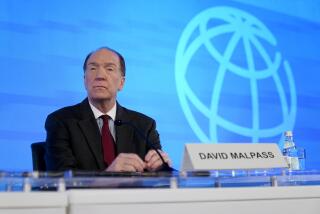IMF Names Camdessus Director for 3rd Term
WASHINGTON — The International Monetary Fund on Wednesday appointed activist Managing Director Michel Camdessus to an unprecedented third term, endorsing his transformation of the IMF into a global firefighter of financial crises.
Camdessus won unanimous support of the 181-nation lending agency’s executive board. Though there had been talk among international financial officials of other candidates, none emerged to challenge the 63-year-old Camdessus for the new five-year appointment.
The former governor of the Bank of France earned the gratitude of the Clinton administration for arranging a rapid $17-billion pledge for the U.S.-led bailout of Mexico after its near default last year. While several irritated European nations saw the move as a rushed rescue of U.S. investors, Camdessus cultivated European support by setting up huge loans to Russia’s pro-Western government in 1995 and again this year.
“He’s won admiration, even from his opponents, because he’s willing to take a position and go to bat for it,” said Frank Vogl, a Washington consultant on international economics.
The IMF was created in 1944 with the narrow mission of keeping exchange rates stable. Camdessus’ view is that with “nearly universal membership” and “extensive expertise,” the IMF is now poised to be the leader of global efforts to achieve economic prosperity.
Camdessus declared in a speech in January that countries must “take a more enlightened view of their own national interests” if they want to make the “increasingly integrated world economy” succeed.
Powerful IMF members, however, have opposed one of Camdessus’ top priorities--a new allocation of the fund’s reserve assets, or special drawing rights. The IMF’s total loans and credits rose from $42 billion in 1993 to $60 billion in 1995; it currently has about $210 billion in capital pledged by its members.
Germany, which sees an increase in reserves as inflationary, was unmoved by the arguments of Camdessus. The U.S. hasn’t seen much reason to back the idea, either.
Global bankers and investment managers see the IMF as “quite a modest source of financing” for most significant emerging markets, said Charles Dallara, managing director of the Institute of International Finance, which represents banks and investment funds in Washington. The institute estimates that almost $200 billion will flow from pension funds, commercial banks and other private sources to the 50 top emerging economies this year.
“The IMF acts as more of a catalyst” for these flows by prodding nations to improve their economic performance, Dallara said.
Camdessus’ reappointment maintains the tradition of appointing a European to head the IMF and an American as president of the World Bank. Three of the last four IMF managing directors have been French, a situation that reflects in part an inability of the Germans and the British to agree on a common candidate, Vogl said. New York investment banker James D. Wolfensohn III heads the World Bank.
More to Read
Sign up for Essential California
The most important California stories and recommendations in your inbox every morning.
You may occasionally receive promotional content from the Los Angeles Times.










